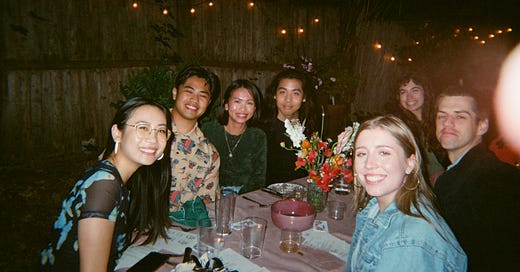Still trying to get a reservation at one of the 50 best new restaurants? Move over.
The most sought-after dining scene in New York City right now is a private dinner party at someone’s (spacious) apartment or quaint backyard. Even Anna Delvey is trying to tap into the business of hosting dinner parties while on house arrest.
There are now restaurants that run like a dinner party, placing strangers next to one another to facilitate conversations. Or you can host an intimate omakase right in your apartment. You’re also bound to hear about a new pop-up dinner series somewhere in hipster Brooklyn or Lower East Side every month.
Chef Courtney Sproule, who transplanted her monthly pop-up Din Din from Portland to New York, promises a five-to-six course meal that tastes as if “Julia Child had joined the riot grrrl movement.” Kendra Vaculin, a food editor at Bon Appetít, just launched Dining Room—and I’m dying to know when the next one is happening. In the same space also houses That Dinner Thing, a monthly supper club that’s gotten so popular you can only get a ticket through a lottery system.
These elaborate supper clubs might be capitalizing on a post-pandemic1 sentiment: the desire to reconnect with human beings in flesh.
Back in June, I was lucky enough to attend the inaugural party of That Dinner Thing. The way I got invited was New York kind of serendipity: I met a guy named Timothy at an after-work happy hour, and he happened to be looking for a plus one.
At the time, I felt like I hadn’t make any spontaneous connections like that in two years. I still had so much pandemic social anxiety that I’d show up at any house party 15 minutes early to acclimate and open the first bottle of wine. (I know that sounds counterintuitive, but I thrive in small groups.)
At this proper supper club where I didn’t know the hosts though, it was awkward to be the first guest. I did have a few minutes to appreciate the setting: fairy lights draping over a beige shade sail, fresh flower arrangements, and picnic tables decorated as if this was an intimate wedding reserved for close friends only.
Timothy and I were seated with six strangers—among them were writers, comedians, and even an Olmsted descendent. The three-course menu was strawberry-themed, and it tasted like a friend’s home cooking. All I remember was how much we bantered and how we shied away from making a toast based on that night’s theme—“duality”—as mandated by the host, Claire Chatinover. (She told me toasting is no longer required, but some guests feel inspired to give one around dessert time anyway.)
Chatinover, the curation lead of TDT, said hosting dinner parties has allowed her to make friends since she moved from LA to NYC in 2018. She told me that people think of NYC as a place that promises connections and experiences, “but when you move here, it's actually a lot harder to break into those concepts.”
If you want a nice meal, you'd just get on Resy to book a table for one or two. But if you say yes to a dinner party or supper club, you’re going there to make friends or potentially meet your next date. The chances of developing a genuine adult friendship with a stranger, though, are quite slim in the age of a social recession, so you better put on your best charm for it. “How much you put in is how much you get out,” Chatinover said. “If you’re closed off, you’re probably not going to meet other people.”
New Yorkers’ obsession with dinner parties isn’t new. And the older we get, the more affluent we become, the more we seem to host and attend these parties. It’s not just because we’re lonely and hungry, but because we feel a visceral need to maintain our social status.
Think of how cool you sound when you tell your coworkers or friends about that dinner thing you went to. You wouldn’t call a Thanksgiving celebration or a double date “a dinner party.” A dinner party—or more formally, a supper club—implies a certain minimum number of guests and an expectation for decent home cooking. The mere act of attending an exclusive or private supper club gives you more social currency. It shows that you have “taste.”
Rather than economic resources, taste—whether for works of art or refined food—is a cultural capital that upholds class distinctions, according to the French sociologist Pierre Bourdieu.
In the context of dinner parties, food is the centerpiece that marks the host’s taste, but the nature of hosting and attending is about status display and identity affirmation.2
As Alice P. Julier wrote in her book Eating Together, dinner parties are performances of class, race, and gender. Dinner party talks, especially among upper-middle class people, often involve “demonstrating culinary mastery and knowledge,” she observed. The ability to discourse about food is essential to maintaining class boundaries.
Serving an evening of good food can also be considered a gift to friends, or a reciprocation of friendship.3 When I think of my social circle’s dinner parties, we’re just guilty of doing middle class food talk. We talk about new recipes on NYT Cooking that might be paywalled, recall how this kombucha was brewed from a scoby smuggled from Taiwan, complain about egg prices, and so forth.
We also try to make the smallest counter space work, and applaud if the host has a dining table that can fit more than four people. When we don’t have enough chairs, a sofa will add three more seats (or we can ask a neighbor in the building). It seems silly to host dinner parties where we have to squeeze past each other to get a glass of water, but we do it anyway. Because it’s also about setting aside time and energy to cook for and share a meal with the people we love.
And because, as psychologist Dr. Jerome Burt said in his TedTalk, an “easy and almost primal way” of fixing our collective disconnectedness is by “breaking bread together.”
“If you break bread rightly, if you do it with the right people, if you do it frequently enough, you won’t ever have to buy another self-help book, take another psychotropic drug,” Burt said. “I’ll even go out on the limb to say that a dinner party will save your life.”
I use the term “post-pandemic” loosely. We’re still in the middle of a pandemic.
Mellor, Jody, et al. “‘When I’m Doing a Dinner Party I Don’t Go for the Tesco Cheeses’: Gendered Class Distinctions , Friendship and Home Entertaining.” Food, Culture & Society, vol. 13, no. 1, Mar. 2010, pp. 115–34. DOI.org (Crossref), https://doi.org/10.2752/175174410X12549021368180.
Spencer, Liz, and Ray Pahl. Rethinking Friendship: Hidden Solidarities Today. Princeton University Press, 2018. DOI.org (Crossref), https://doi.org/10.2307/j.ctv346r5j.





